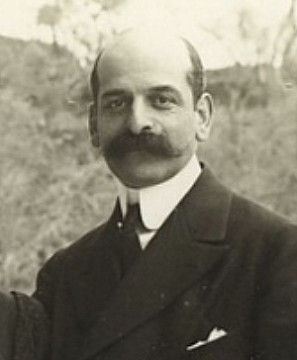Felix Moritz Warburg (1871-1937)
Financier & Philanthropist, of New York
He was born in Hamburg where his family had been settled since 1630, but he was not viewed as bright enough to join the family bank established by his great-grandfather in 1798. Instead, he was sent to be educated with his maternal grandfather in his pearl and diamond business. As a junior partner with N.M. Oppenheim & Co., he was shipped around Germany with precious stones sewn into his clothes, and admiring his witty and gregarious grandfather he adopted him as a role model.
In 1895, at New York, he married Frieda, daughter of Jacob H. Schiff, senior partner in the bank of Kuhn, Loeb & Co., and second only in importance on Wall Street to J.P. Morgan. Whereas Schiff was notoriously stern, serious and unamused, Felix was his very antithesis: he was fun-loving, light-hearted, jovial, charming, and a positive energy. After some initial remonstrations from his dour father-in-law-to-be, Schiff accepted the match. Felix was given a partnership in Kuhn, Loeb & Co., and was naturalized as an American in 1900. After Schiff died, he and Otto Kahn successfully continued what was one of the most important investment banks in the States. Having been given a fully furnished and staffed townhouse at 18 East 72nd Street as a wedding present, he and Freida built the magnificent Felix Warburg House on Fifth Avenue that since 1947 has been home to the Jewish Museum. Their country home, the Woodlands, was outside White Plains, N.Y.
Felix is remembered as a philanthropist in the truest sense. He, "enjoyed an international reputation as a philanthropist... an indefatigable worker in the fields of charity and social welfare... his great ideal was the promotion of inter-racial and international cooperation." He was not a Zionist and was opposed to the creation of a Jewish state, yet he strove to see Palestine become a refuge for oppressed peoples in Eastern Europe, believing it afforded, "a unique opportunity to prove that Jews and Arabs could work co-operatively together." He was the founder and first president of the American Friends of the Hebrew University in Jerusalem. He was a co-founder of the university and one of its chief beneficiaries having established it as a means of, "encouraging Jewish and Arab scholars to supplement one another's studies of their inter-related civilizations."
Felix's obituary in The New York Times stated that, "few worthy causes failed to win his support and his own business affairs were at all times subordinated to his philanthropic interests". Under his direction, the Warburg family's combined philanthropic activities benefitted over 200-institutions and societies, and on Felix's 60th birthday in 1933, U.S. President Herbert Hoover personally thanked him for his philanthropy, "not only of distinguished value to the Jewish people, but also outstanding benefit to all, especially the children". Perhaps it was only fitting for a man whose heart was so big, that it gave out early in 1937. Felix's funeral was attended by 2,000-people and more than a 1,000 lined the streets outside requiring 55-policeman to manage the traffic.
In 1895, at New York, he married Frieda, daughter of Jacob H. Schiff, senior partner in the bank of Kuhn, Loeb & Co., and second only in importance on Wall Street to J.P. Morgan. Whereas Schiff was notoriously stern, serious and unamused, Felix was his very antithesis: he was fun-loving, light-hearted, jovial, charming, and a positive energy. After some initial remonstrations from his dour father-in-law-to-be, Schiff accepted the match. Felix was given a partnership in Kuhn, Loeb & Co., and was naturalized as an American in 1900. After Schiff died, he and Otto Kahn successfully continued what was one of the most important investment banks in the States. Having been given a fully furnished and staffed townhouse at 18 East 72nd Street as a wedding present, he and Freida built the magnificent Felix Warburg House on Fifth Avenue that since 1947 has been home to the Jewish Museum. Their country home, the Woodlands, was outside White Plains, N.Y.
Felix is remembered as a philanthropist in the truest sense. He, "enjoyed an international reputation as a philanthropist... an indefatigable worker in the fields of charity and social welfare... his great ideal was the promotion of inter-racial and international cooperation." He was not a Zionist and was opposed to the creation of a Jewish state, yet he strove to see Palestine become a refuge for oppressed peoples in Eastern Europe, believing it afforded, "a unique opportunity to prove that Jews and Arabs could work co-operatively together." He was the founder and first president of the American Friends of the Hebrew University in Jerusalem. He was a co-founder of the university and one of its chief beneficiaries having established it as a means of, "encouraging Jewish and Arab scholars to supplement one another's studies of their inter-related civilizations."
Felix's obituary in The New York Times stated that, "few worthy causes failed to win his support and his own business affairs were at all times subordinated to his philanthropic interests". Under his direction, the Warburg family's combined philanthropic activities benefitted over 200-institutions and societies, and on Felix's 60th birthday in 1933, U.S. President Herbert Hoover personally thanked him for his philanthropy, "not only of distinguished value to the Jewish people, but also outstanding benefit to all, especially the children". Perhaps it was only fitting for a man whose heart was so big, that it gave out early in 1937. Felix's funeral was attended by 2,000-people and more than a 1,000 lined the streets outside requiring 55-policeman to manage the traffic.










